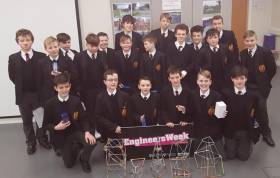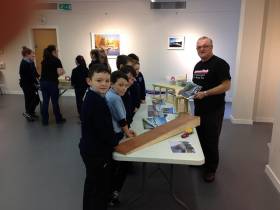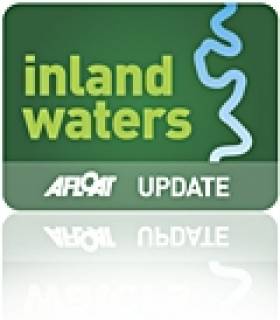Displaying items by tag: Engineers Week
Celebrate Engineers Week With Galway Atlantaquaria and the Marine Institute
This weekend, Saturday 5 and Sunday 6 March, Galway Atlantaquaria and the Marine Institute support STEPS Engineers Week with a weekend of fun, facts and competitions at the national aquarium in Salthill.
The weekend will be dedicated to the Argo float and showcase the importance of marine science and engineering.
Argo floats are robotic instruments that drift with the ocean currents and are engineered to move up and down between the surface and a mid-water level collecting data as it travels the ocean.
Each float is programmed to rise to the surface every 10 days to transmit its data via satellite so scientists can monitor the ocean temperature and circulation. At the surface, the Argo float can also receive new mission instructions when it connects to the satellite.
There are currently close to 4,000 floats in the Argo Programme collecting and transmitting data from areas of the global ocean that would otherwise be impossible to reach.
Galway Atlantaquaria will have an Argo float from the Marine Institute on display over the weekend. Visitors can view this marine robot up close and can take a look inside at the inner workings and electronics that drive it on its mission.
Each day, there will be videos showing how the Argo floats are deployed at sea and how they work. Visitors can view the full global fleet online and see the data they transmit back via satellite.
Argo floats distribute real-time information on temperature and salinity down to a depth of 2,000 metres below the ocean’s surface. Measuring the temperature and salinity of the ocean is crucial in better understanding climate change and the role of our oceans on our climate.
Garry Kendellen of Galway Atlantaquaria said: “I have followed the floats for a long time, and these devices are an amazing example of engineering to help us monitor the ocean. The climate crisis is of great danger to our own health and these devices give us valuable information on changes in ocean circulation.”
All are invited to attend and talk with scientists from Galway Atlantaquaria and the Marine Institute to discover why marine engineering is so important. There will be plenty to see and do with puzzles, fun and competitions to be won.
But be sure to book early to avoid disappointment on the Galway Atlantaquaria website at www.nationalaquarium.ie.
Engineers Week brings the fascinating world of engineering to life in communities nationwide, inspiring children to engineer the Ireland of tomorrow.
#EngineersWeek - Demand was high for Waterways Ireland’s events during Engineers Week 2017, with 200 primary and post-primary pupils taking part in free site visits and workshops offered at the agency’s headquarters in Enniskillen.
Pupils from Florencecourt PS, Moat PS, Jones Memorial PS, St Mary's PS Mullymesker, Ballinamallard PS, St Mary's PS Enniskillen, Tattygar PS and St Joseph's College met Waterways Ireland engineering staff who led them through a series of workshops including bridge building, making floating and fixed jetties, marshmallow and straw tower challenges and understanding the Archimedes screw.
A further 130 school children attended events at Monasterevin Lock & Lifting Bridge in Kildare and Portumna Bridge in Galway.
Waterways Ireland says feedback from schools has been “very positive” with many expressing interest in attending future educational events to inspire the next generation of engineers.
Engineers Week took place from 4-10 March and is a programme of nationwide events with the aim of celebrating the world of engineering in Ireland.
The theme for 2017 was ‘Engineering Our Future’, aimed at igniting the imaginations of the next generation of engineers.
Engineers Week is co-ordinated by Engineers Ireland and is a platform to highlight engineering as a career and recognise the importance of the continually evolving engineering profession. The event is an ideal opportunity to showcase the positive contribution made by Waterways Ireland to local communities.
There are a range of engineering professionals, including civil and mechanical engineers and technicians working within Waterways Ireland.
The projects carried out on all seven of its inland waterways are wide and varied, from navigation operation, maintenance and development and structural design to project management, fleet management, development and maintenance of electro-hydraulically operated lock gates and accompanying smart card system, and much more.
Each year Waterways Ireland engineers share their expertise by giving presentations and hosting site visits with local school groups, which book up well in advance.
School Children Float & Boat For Engineers Week
#InlandWaters - Waterways Ireland has hosted a series of successful site visits and workshops for primary pupils to visit the Barrow Navigation and the Erne System as part of Engineers Week 2016.
Now in its 10th year, Engineers Week is a programme of nationwide events with the aim of celebrating the world of engineering in Ireland.
The theme for 2016 was 'Engineering Our Future' – aimed at igniting the imaginations of the next generation of engineers.
More than 50 pupils from St Johns NS, Monasterevin and Kildangan NS came to the Barrow in Monasterevin to meet the Waterways Ireland engineering staff who brought them on a tour around the operation of the lifting bridge, the aqueduct and the lock.
Meanwhile, over 75 students from Brookeborough PS, Jones Memorial PS and Ederney PS visited Waterways Ireland headquarters in Enniskillen where engineers led them through a series of workshops including bridge building, making floating and fixed jetties, marshmallow challenges and the Archimedes Screw.
According to Waterways Ireland, feedback from schools has been very positive with many expressing interest in attending future educational events – and a number of children stating that they want to become engineers in the future.
Engineers Week highlights the range of work undertaken by the engineering staff of Waterways Ireland, which employs civil and mechanical engineers and technicians on a range of projects on all seven navigations managed by the organisation.
Projects include navigation operation, maintenance and development, structural design, project management, fleet management, development and maintenance of electro-hydraulically operated lock gates and accompanying smart card system, and many more.
Waterways Ireland has brought over 1,500 pupils to the waterways principally for Engineers Week over the last three years of the programme.
Waterways Ireland Schools Visit Programme For Engineers Week 2015
#InlandWaters - Waterways Ireland is hosting a series of free site visits on Ireland's navigable waterways during Engineers Week 2015 on 7-11 February.
The site visits are on offer to primary and secondary students at the following locations:
The Shannon Navigation at Tarmonbarry Lock on Monday 9 February. Tour times are 10am, 11.30am and 1.30pm. Each tour lasts for 90 minutes approx. (Offered to primary and secondary students.)
The Grand Canal at Waterways Ireland Visitors Centre, Grand Canal Quay, Dublin 2 on Monday 9 February. Tour times are 10am, 11.30am and 1.30pm. Each tour lasts for 90 minutes approx. (Tour open to primary students only.)
The Erne System at Waterways Ireland Headquarters, Enniskillen on Monday 9 February. Tour times are 10am, 11.30am and 1.30pm. Each tour lasts for 90 minutes approx. (Offered to primary and secondary students.)
The Shannon-Erne Waterway at Lock 6, Ballinamore on Thursday 12 February. Tour times are 10.30am and 1pm. Each tour lasts for 90 minutes approx. (Offered to primary and secondary students.)
Engineers Week is a programme of nationwide events with the aim of celebrating the world of engineering in Ireland. The theme for 2015 is 'Engineering is for everyone', highlighting how engineering touches the lives of every citizen. It is an ideal opportunity to highlight the range of work undertaken by the engineering staff of Waterways Ireland.
There are a range of engineering professionals including civil and mechanical engineers and technicians working within Waterways Ireland. The projects carried out on all seven navigations managed by the organisation are wide and varied, and include navigation operation, maintenance and development, structural design, project management, fleet management, development and maintenance of electro-hydraulically operated lock gates and accompanying smart card system, plus many more.
Tours are primarily aimed at senior national school students as well as secondary school students. Booking is essential and is on a first come, first served basis. Please note a maximum of 30 students can be accommodated per tour.
To register your interest in attending one of the visits offered or to find out more information regarding any of the site visits offered by Waterways Ireland, contact the Education Officer at 071 96 50787 or [email protected].
































































